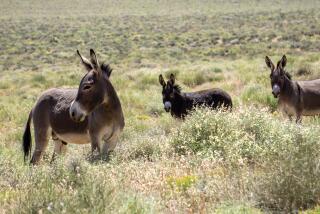Mendocino County suspends contract with a federal wildlife agency
- Share via
In a settlement with a coalition of animal advocacy groups, Mendocino County has agreed to suspend renewal of its contract with a federal wildlife management agency pending completion of an environmental impact report that will consider nonlethal methods of predator control.
The move came five months after the coalition filed a lawsuit accusing the county of failing to complete a legally required environmental review before approving a $142,356 contract authorizing the U.S. Department of Agriculture’s Wildlife Services Agency to kill predators including coyotes.
Under the terms of the settlement, the coalition led by the Animal Legal Defense Fund, the Animal Welfare Institute, the Center for Biological Diversity, the Natural Resources Defense Council and Project Coyote agreed to dismiss its lawsuit.
The lawsuit was part of an effort to sharply limit the number of animals killed by the controversial agency on behalf of livestock grazers and other agricultural interests.
“This settlement is a major step forward,” Amy Atwood, an attorney with the Center for Biological Diversity, said in an interview. “It opens the door for similar actions in other counties that contract with this agency, which currently operates in near secrecy.”
“Taxpayers deserve to know a lot more about how it kills animals,” she said, “and exactly why it does so.”
The agency kills more than 75,000 coyotes a year in the United States with poisons, traps and snares that “are cruel and pose a danger to both people and their pets,” the suit said. Exterminating coyotes also disrupts ecologies and isn’t effective, it said.
The agency said it killed more than 2.7 million animals in fiscal 2014 including gray wolves, coyotes, black bears, river otters, jackrabbits, muskrats, skunks, opossums, porcupines, raccoons, albatrosses, wood storks, white-faced ibises and snapping turtles.
Since 1996, the agency has shot, poisoned and strangled by snare more than 27 million native animals, according to the Center for Biological Diversity.
Mendocino County joins a growing number of local governments that are reviewing their contracts with the agency, and considering nonlethal methods of controlling wildlife that emphasize coexistence.
The City of Seal Beach is completing a nonlethal coyote management plan in cooperation with the Humane Society of the United States and nearby cities including Garden Grove and Long Beach.
In 2011, the City of Calabasas adopted a coexistence plan with assistance from Project Coyote.
In 2000, Marin County replaced its Wildlife Services Agency contract with a nonlethal predator control program.
------------
For the Record, 2:31 p.m., April 15: An earlier version of this post gave the wrong year for when Calabasas adopted a coexistence plan. It was 2011, not 2012. Also, Marin County replaced its agency contract in 2000, not 2002.
------------
Follow me @LouisSahagun for more fascinating stories







